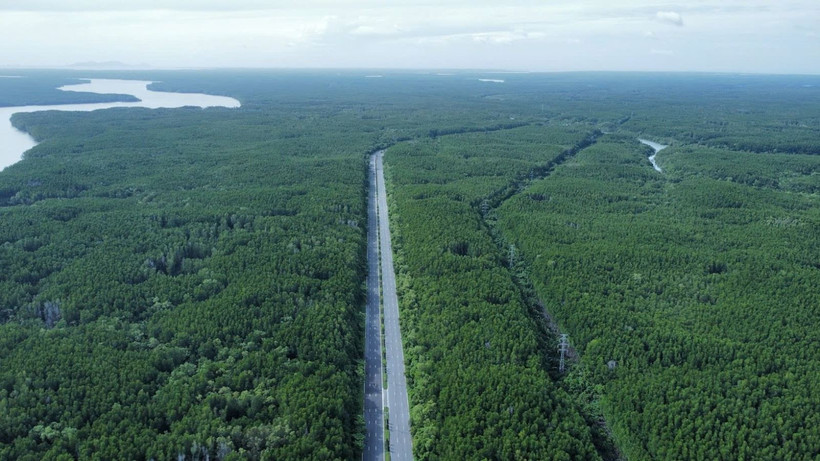Hugo Pierrel, Deputy Country Director of the French Development Agency (AFD) in Vietnam, shared his views on the country’s impressive development, major milestones in cooperation, future prospects, and policy recommendations, while highlighting the role of development partners in Vietnam’s 80-year journey of renewal and development.
Over the last eight decades, Vietnam has emerged as a regional model for economic transformation, drawing strong support from development partners, notably AFD as one of its most enduring.
Pierrel noted that Vietnam has undergone a “remarkably impressive” socio-economic development journey, marked by structural reforms and sustainable growth, moving from a underdeveloped country to middle-income status in 2017 and now on track to join the upper-middle-income group.

Poverty reduction is one of the country’s remarkable achievements, with the extreme poverty rate falling from 45% in 1990 to below 1% today, he said, noting that this reflects the Vietnamese Government’s persistent efforts through concrete actions, sound resource allocation, and effective handling of essential socio-economic issues.
Progress is also evident in broader access to energy, clean water, and education, with universal education being seen as evidence of effective macro-governance and consistent reforms steadfastly pursued by the Party, State, and Government, he added.
According to the AFD official, Vietnam’s economic management has been “exemplary,” building strong confidence among international partners. The country has skillfully leveraged trade integration, attracted FDI, and effectively used support from agencies like AFD to boost agricultural exports and expand production.
Key cooperation milestones of AFD in Vietnam
Present in Vietnam since 1994, AFD has accompanied the country for 31 years. As France’s bilateral development bank, together with its affiliates Proparco and Expertise France, AFD has committed a total of 3.2 billion EUR (around 3.73 billion USD) in support of Vietnam.
According to Pierrel, AFD’s cooperation in Vietnam can be divided into three key phases. The first, starting in 1994, focused mainly on agriculture and agro-processing, particularly strategic crops such as rice, coffee, tea, and rubber, with the aim of boosting agricultural development and processing capacity. Funding also supported irrigation, water management, and hydraulic infrastructure, laying the foundation for long-term growth.
The second phase, in the early 2000s, coincided with Vietnam’s push for economic infrastructure. AFD shifted its financing accordingly, backing major projects such as partnerships with Vietnam Electricity (EVN) and the National Power Transmission Corporation (EVNNPT), the upgrade of the Yen Vien–Lao Cai railway, and co-financing Hanoi’s Metro Line 3.
Since 2015, AFD’s work in Vietnam has entered a new phase. Following the Paris Agreement, the agency was tasked with scaling up support for emission reduction and climate adaptation programmes. In Vietnam, AFD has been a key player in the energy transition, backing projects in energy and transport aligned with the National Power Development Plan VIII and the Government’s net-zero commitment by 2050.
Beyond financing, AFD also engages in policy advice and capacity building through initiatives such as the economic research programme on climate change (Gemmes Vietnam). It has further promoted peer-to-peer partnerships, linking EVN with France’s EdF (Électricité de France), and Hanoi with the Île-de-France region in Paris.
Challenges and recommendations for future cooperation
While acknowledging Vietnam’s significant progress, the AFD official also highlighted key challenges in project implementation, including land management and site clearance, complex approval procedures, and biodiversity. He noted that large infrastructure projects can have lasting impacts on ecosystems, stressing the need for Vietnam to minimise negative effects and integrate conservation measures from the planning stage.
Commenting on Vietnam’s institutional reform programme launched in early 2025, Pierrel said it marks a positive step for Vietnam’s administrative system and all-level governance, creating opportunities to improve efficiency and support the country’s ambitious goal of high-income status by 2045.
To sustain sustainable growth, Pierrel recommended integrating four priorities into national development policy - building a low-carbon production and consumption system and reducing reliance on fossil fuels; mainstreaming climate action across all policies at both central and local levels, in both public and private sectors; strengthening solid infrastructure and institutional foundations to support economic growth; and developing high-quality human resources as a key driver to improve labour productivity, and boost added value.
He also stressed the need to clearly define the role of public and private investment in major projects, noting that in strategic sectors such as power transmission, the State should take the lead to ensure system stability, thereby encouraging private investment in energy production. On the financial market, Vietnam must ensure fair access to credit for all economic actors, using appropriate policy tools to realise the goal of green growth.
Development partners like AFD stand ready to work alongside the Vietnamese Government, sharing experience, expertise, and technology to achieve its ambitious development goals, Pierrel affirmed.
He stated that the partnership between AFD and Vietnam goes beyond financial support, serving as a bridge for knowledge, technology, and governance toward a prosperous and sustainable future for the southeast Asian nation./.



















